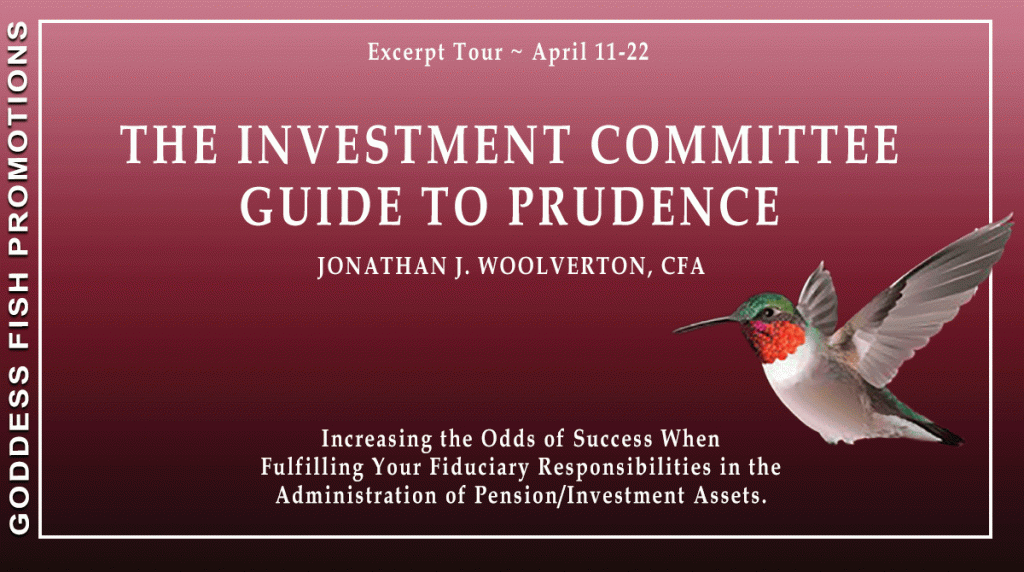This post is part of a virtual book tour organized by Goddess Fish Promotions. Jonathan J. Woolverton, CFA will be awarding a $15 Amazon or B/N GC to a randomly drawn winner via rafflecopter during the tour. Click on the tour banner to see the other stops on the tour.
JJ’s investment career spans more than five decades. He has been the chief investment strategist for a pension plan sponsor, a managing director and senior consultant within a global investment planning consultant firm, and a managing director and chief operating officer of an investment management organization. Over his career, JJ has attended well over a thousand investment committee meetings as a plan sponsor, a consultant, and a money manager. In the majority of these meetings, he has found that committee members lack three things: in-depth investment expertise to effectively carry out their fiduciary responsibilities, the necessary time allocation to administer and manage the investment program in the best interests of the beneficiaries, and the ability to develop an efficient monitoring system to hold all service providers accountable for the products and services they provide.
This book outlines the steps to be taken in establishing investment policy; formulating asset mix strategy; creating an appropriate investment management structure; undertaking investment manager searches; and highlighting the conflicts of interest, biases, and self-interests of the various service providers.
This book is designed to assist members of investment committees in their role as fiduciaries/trustees/administrators.
Read an Exclusive Excerpt
One of the responsibilities of the investment committee is providing effective and timely communication to existing beneficiaries of the plan. The information shared should provide comfort to all beneficiaries that their funds are in capable hands. However, in practice, communication with plan beneficiaries often seems to receive the least amount of time and energy spent, and seems to be a relatively low priority for the plan sponsor. Beneficiaries, typically, do not have the investment expertise to understand the importance that capital market returns have in creating or securing wealth for their retirement years. The plan sponsor has the responsibility to both inform and educate—whether within a defined-benefit plan or a defined-contribution plan.
In summary, the role of the plan sponsor is to create an investment program for the sole benefit of the plan’s beneficiaries. Plan sponsors must act in a fiduciary function to ensure that the administration, management, and implementation of the investment program is free from biases and conflicts of interest.
Plan sponsors must:
• outline their specific beliefs;
• determine the goals and objectives needed to deliver on the promises made to beneficiaries;
• understand the risk tolerance and appetite at the total fund level;
• set the framework for asset mix policy; and,
• create oversight processes and procedures as a check that the various components of the investment program are delivering as expected.
One of the primary responsibilities of the plan sponsor is to set up an investment committee to implement, execute, monitor, and evaluate all activities related to the ongoing investment of all plan assets. In so doing, the plan sponsor must determine the roles, authorities, and responsibilities of the members of the internal investment committee. The highest priority is to ensure that the committee members have the investment knowledge, experience, and skills needed to implement the investment program effectively and efficiently.
About the Author: Jonathan J. Woolverton, CFA, has spent his whole career in the investment field—over fifty years. After graduating from university in Pennsylvania, he moved to Toronto, Canada, where he began his career in the investment department of an insurance company. In his role as investment officer he was responsible for formulating investment strategy and overseeing all investments within the equity and fixed-income divisions. JJ later joined Ontario Hydro as their chief investment strategist where all pension funds were managed internally.
JJ left the money management business to become an investment planning consultant. He was a founding partner and managing director of Frank Russell Canada. He moved back to the money management side as the managing director and chief operating officer of Guardian Capital Inc. JJ graduated from Westminster College with a BBA and achieved his Chartered Financial Analyst certification. JJ has published numerous articles on the pension and investment industries and has been the keynote speaker at many conferences and seminars.
Buy the book at Amazon, Amazon CA, Indigo Chapters, Barnes and Noble, iBooks, or Smashwords.
























Thanks for hosting!
Great excerpt, thank you.
Sounds like a fantastic read!